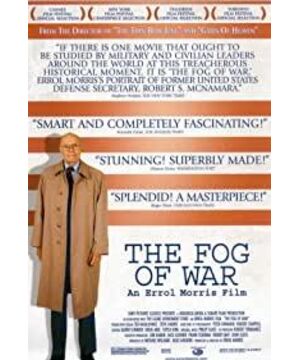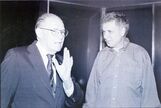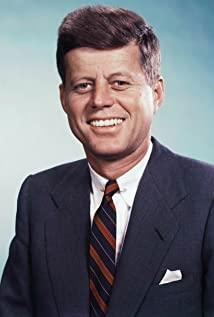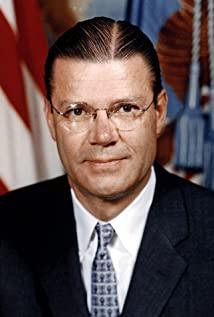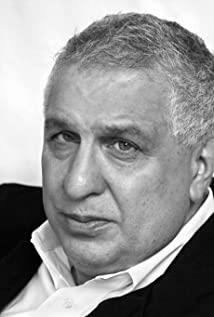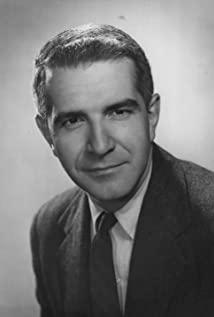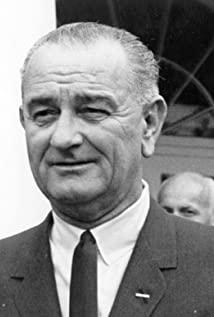by Qianwuqian
Our generation has never experienced war, but the word fog of war is never absent in our lives, and now it refers to the invisible setting of the computer in the battle game The area of the game will be covered with black fog that the player has never explored before. This setting also makes the game on both sides more exciting, because the fog means that no one can know the intention of the other party. Maybe Inadvertently, there will be battles, and the battle situation will change as the fog dissipates. And this Oscar-winning documentary is the protagonist of the US Secretary of Defense McNamara to clear the fog to reproduce his choice in the war. In the film, at the age of 85, he shuttles to the side of his 45-year-old self to tell the story of what he has experienced. Although he is 45 years old, he is young and powerful. From the president of Ford to the US Department of Defense, from Kennedy to President Johnson, he relies on his own Extraordinary wisdom controls the fate of the U.S. military in war. But the 85-year-old cautiously answered the questions threw him by the voiceover, trying to reflect on what he had done after the time had passed. As he quotes at the end of the film "Let's not stop exploring, at the end of our exploration we will go back to where we started, and see this place clearly for the first time", he takes us back to where he originally started
The insight that years brought to McNamara was summed up by him in eleven pieces of advice. Each piece of advice is a reflection on the tension between the state, diplomacy, individuality and rationality. For us observers of foreign policy, it is undoubtedly a reflection on the theory of foreign policy analysis. When the traditional game theory is used, the rational analysis model of game theory is used. When it comes to hypothetical actors on both sides, McNamara tells us that if Khrushchev and Reagan had made their decisions rationally in the Cuban Missile Crisis, the world would have been destroyed in a world nuclear war. In the film, he asked himself hysterically: "What stopped the war, no, it's not rational, it's just luck". Therefore, when we consider the feasibility of theoretical analysis and rational decision-making, we need to consider things other than rationality, because whether it is the Soviet Union and the United States in the Cold War, the Vietnamese and American policymakers in the Vietnam War thought of and the beliefs they adhered to are possible. Misjudgment occurred. As Jervis told us in his famous book "Perception and Misperception in International Politics", what determines our choices may be only the world we perceive, and this world may be the exact opposite of reality. So, like 85-year-old McNamara, judge your decisions and answers carefully. Was the Vietnam War Jensen's responsibility? Do you think you should be responsible for the Vietnam War? Such a question remains ambiguous for McNamara, because history never likes counterfactuals, and McNamara believes he has made the best choice in that changing world at that point in time. Although during the anti-Vietnam war he was known as the culprit of the war, the dictator, but now from a foreign policy perspective, we can no longer simulate the exact same decision-making scenarios that once were, so what McNamara did The strict requirements for the rationality of the policy can only be an afterthought, which is too strong.
In fact, there is a deeper theme hidden under the documentary discussion and decision-making - reflection on war and human nature. I think it is precisely because this documentary tries to make the audience think deeply about this theme through the perspective of the witnesses, and finally achieved The film won the Oscar for Best Documentary. "In order to achieve good things, you have to do evil things" appeared on the subtitles. There is no narration, just the scene of the US bombing North Vietnam. In the restored scene, the missiles fell one by one into the villages and fields, and then thick smoke rose and the plane flew by. Until McNamara appeared and admitted to North Vietnam with a bit of loneliness that defoliant was used, he kept defending himself that "there has never been any legal provision against the use of such chemical weapons", he wanted to say that he was not wrong but always Some lack confidence, saying that they will never violate the law and issue a military order. Although the filmmakers did their best not to comment on McNamara's decision in the film, his attempt to use legal legitimacy to cover up his disregard for humanity in his war decision made viewers find it somewhat ironic. It is indeed impossible to criticize his behavior at the time, but from the 85-year-old, from today's point of view, it is indeed the evil of war, and no amount of legal legitimacy can wash it away. Remember that Hannah Arendt mentioned "banal evil" in her book The Origins of Totalitarianism, and the executioner of the concentration camp justified that he was only carrying out the above orders, and that a trivial statement had covered all the responsibility in Under the words "command from above", they thought they were nothing more than the executor of the command. How similar the logic is to McNamara's rhetoric. Arendt believes that the proliferation of "banal evil" caused the Nazis' ferocity at that time, and no amount of McNamara's legitimacy can cover up the war. The evil of human violence. International relations scholars, media, civil society organizations, and the international community are all discussing just war at this level. War and conflict have never disappeared in history since the birth of mankind. Even scholars such as Charles Tilly believe that war is shaped by war. The modern state, but this does not allow us to lose the grasp of the bottom line of human nature in war. This is just like the anarchy mentioned by Hobbes in Leviathan, but does the anarchy of "man against each other" mean that there is an order without rules? Obviously, Locke and Rousseau have already given the answer in their writings, and it is precisely because of this that the theory of the social contract and the theory of international society of the British school came into being. After watching this film, I can no longer agree with what McNamara told us that "war is very complicated, beyond the comprehension of human reason." decision maker or the whole person
View more about The Fog of War reviews


